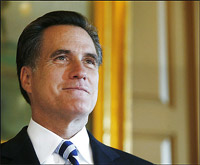 In what may be the defining moment of his campaign, Mitt Romney, the former governor of Massachusetts and a Mormon, addressed the issue of faith and its bearing on his pursuit of the presidency. Pundits inevitably compared Romney's speech in College Station, Texas, with the speech that John F. Kennedy gave just down the road at the Rice Hotel, Houston, on September 12, 1960.
In what may be the defining moment of his campaign, Mitt Romney, the former governor of Massachusetts and a Mormon, addressed the issue of faith and its bearing on his pursuit of the presidency. Pundits inevitably compared Romney's speech in College Station, Texas, with the speech that John F. Kennedy gave just down the road at the Rice Hotel, Houston, on September 12, 1960.
The parallels are unmistakable. Both men felt compelled to address what was openly discussed as the "religious issue" in 1960. Both men were reared in a tradition different from Protestantism, which claims the allegiance of at least a plurality (if not a majority) of Americans.
But the parallels end there. Unlike Mormonism, Roman Catholicism was well known to most Americans in 1960, although many Protestants had a jaundiced view of the Roman Catholic Church. Many Americans, by contrast, know little about Mormonism, officially named the Church of Jesus Christ of Latter-day Saints. Many Americans see Mormons as strange and secretive; their temples, for instance, are closed to "gentiles" (non-Mormons). The Mormon notion of God as both male and female, baptism for the dead, and even the practice of wearing Mormon underwear (thought by many to have protective powers) strike many as unorthodox, if not downright bizarre.
For evangelicals, some tenets of Mormonism are particularly troubling. Mormons accept the Hebrew Bible (Old Testament) and the New Testament as divinely inspired, but they believe that the Book of Mormon, discovered by Joseph Smith in Palmyra, New York, in 1827, is similarly inspired. And Mormons believe that the president of the Latter-day Saints is the conduit for continuing inspiration. Evangelicals, on the other hand, view the Bible (Old and New Testaments), as the "word of God" and their sole religious authority. For another religious group to add to the canon of scripture strikes most evangelicals as utter blasphemy.
These suspicions do not augur well for Romney. Politically conservative evangelical voters are a core constituency for the Republican Party. In order to win the Republican nomination, Romney needs the support of conservative evangelicals, especially in Iowa.
Throughout the early months of the campaign, Romney sought to downplay his faith, protesting that he was not a spokesman for Mormonism. But many voters, evangelicals especially, have not been mollified
Got something to say about what you're reading? We value your feedback!